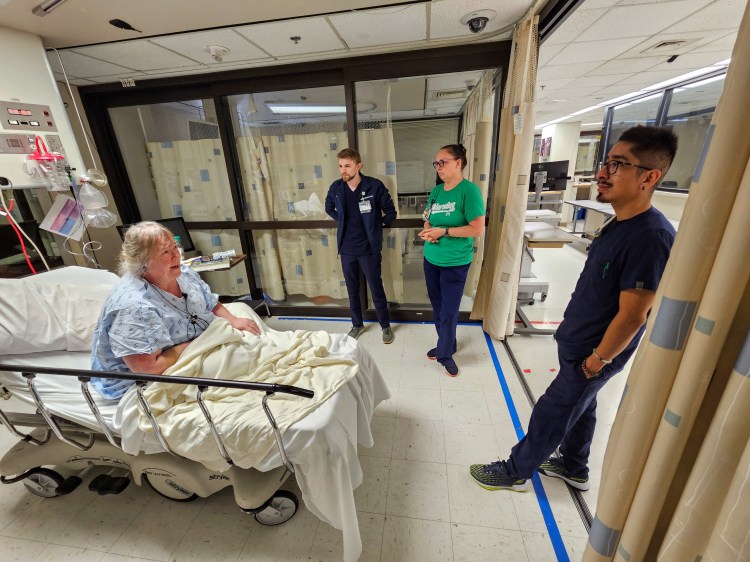Disruptive Patient sim helps learners hone de-escalation skills

Sometimes, de-escalation requires escalation.
UAB Clinical Simulation’s Disruptive Patient sim serves to teach new nurse leaders how to handle such patients with aid from the numerous resources available through UAB Medicine.
The crux?
“You are not alone,” said Ronny Taylor, facilitator and nurse manager in the Center for Patient Flow. “UAB has many resources available to help in these situations. Escalate to these resources early to prevent the situation from escalating.”
Taylor noted that those resources include the NRC/house supervisor, risk management and ethics departments, psych nurse liaison, conflict response team, administrator on call, director of nursing on call, milieu coordinator, addiction team and the UAB Police.
The simulation puts learners in an immersive scenario with a standardized patient (SP). An SP is a person trained to portray a patient, demonstrating their medical history, physical exam findings and emotional responses to provide learners with realistic experience. For the sake of the disruptive patient simulation, the SP acts, well, disruptively, exhibiting aggressive behavior in a realistic manner.
“It was more realistic than I was expecting,” said learner Joseph Kimble, R.N., of UAB Medicine’s Medical Nursing Department. “When it comes to a disruptive patient, I think sometimes there’s no easy answer, but there are resources to help you get to a solution.”
Although the SP brought a heightened sense of realism to the simulation, learners were still able to train in a psychologically safe environment.
“It was a relatively stress-fee way of improving your clinical response to these types of situations,” said Jose Cuicahua Perez, R.N., assistant nurse manager at UAB Highlands.
“Simulation is such an amazing tool,” said Kathleen Bright, education coordinator with UAB Medicine Risk Management. “Participating in real-time situations with standardized patients can be really surprising, and staff can learn about themselves and improve upon their clinical skillset.”
To inquire about how simulation can benefit your own team or department, email simulation@uabmc.edu.
UAB Medicine’s Clinical Simulation program offers opportunities for individuals and teams across UAB Medicine and beyond to practice before they deliver care. We encourage all who provide and support patient care to “SimFirst.” Together, we can put our patients’ safety first.




0 Comments